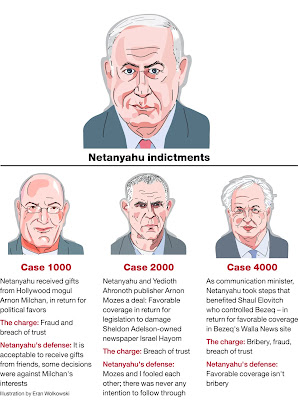– by Alexander Jones –
Israeli Prime-Minister Benjamin Netanyahu was reelected last month, making him the longest serving leader in the country’s history. Despite accusations of very serious corruption, and a recommendation by the Attorney-General to indite him, a significant majority nevertheless voted for him and his right-wing bloc. This gives him a powerful mandate to press forward with plans for some very concerning law changes.
Top of Netanyahu’s wish list is the so-called ‘French law’, which prevents a sitting Prime Minister from being prosecuted for the duration of his or her term. If this law were to pass, any criminal accusations would be irrelevant – as long as he remains in power. It does this by limiting the ability of the court to intervene in law making.
 |
What’s he worried about? A summary of the three
cases against him. Graphic from: Ha’aretz |
Netanyahu cites the court’s increasing activism as motivation and says that he wants to see a “restoration of the balance between the branches [of government].” He says his government needs to be able to “pass laws that have been struck down in the past, laws the public expects us to pass: the expulsion of terrorists’ families, the death penalty for terrorists and a deportation law for [African migrants].” Raoul Wootliff in the Times of Israel points out that worryingly, the first of these two laws have not in fact been struck down by the courts, but Netanyahu seems to think that if and when they were proposed the court would intervene. The only way for them to pass is if the courts are out of the picture! Haaretz claim that Netanyahu has made supporting this law a condition of joining the coalition, though this is strenuously denied by the Likud party’s negotiators.
The proposed law is emblematic of the shift away from transparency in Israeli government, and the erosion of democratic values here. Although much energy has been spent trying to understand the rise to power of world history’s worst tyrants, and even school children in dozens of countries worldwide could give a decent explanation of, say, Hitler’s ascent in Germany, it is more difficult to understand more subtle collapses of democratic states. At what point did modern-day Turkey, or Russia, stop being considered wholly democratic? Which was the law which broke the camel’s back? No authoritarian state has ever been imposed overnight, and it is the small steps in this direction which usually go unnoticed that anyone who believes in democracy should be concerned about. Under Netanyahu Israel has certainly begun a journey in this direction, and who can say where it ends?
Among the world’s robust democracies, Israel is also uniquely at risk. Readers should keep in mind that many of the devices which act as checks and balances in other countries do not exist in Israel. Israel’s parliament, the Knesset, is unicameral – meaning there is no second chamber to oversee any law changes. Israel has no codified constitution. Israel has no Bill of Rights. Israel has no term limits. It uses a highly centralised system which sees almost no legislative power given to regional governments. It is also a fairly young democracy at 71 years. And finally Netanyahu has been accused several times of interfering with the Israeli media. When you factor in the ongoing Occupation, a culturally divided population, real external threats, influential religious courts, powerful armed forces and a massively militarised society, is it crazy to begin to feel anxious for the state of Israel’s democracy?
 |
| They were happy to see the Empire rise in Star Wars! |
An even scarier thought is that often throughout history, the people themselves do not mourn the loss of democracy, but welcome it or end up demanding changes for security reasons. Netanyahu’s opponents in the last election based their entire campaign around the premise that they were fighting to save Israeli democracy, and most voters flatly ignored them. Should we really care about saving the rule of the people when the people themselves appear to be not too bothered in the ballot box?
 |
| Fez wearing protesters in Tel Aviv, May 2019 |
Certainly not everyone feels this way. Over 100,000 people attended a rally against the proposed law changes in Tel Aviv on Saturday. Many people came wearing a red fez, alluding to the fact that Israel is not yet Turkey – despite Netanyahu appearing more and more like Erdoğan. It has also proved much more difficult for Netanyahu to form a coalition than most predicted, meaning another election could take place in August. This would greatly reduce the chance of the new law being passed in time to protect him from the courts.
Israel is a “Jewish and democratic” state and at various times in its history has struggled with these two keys parts of its identity. This is one such time. In 2018, the government passed the Basic Law: Israel as the Nation-State of the Jewish People, a clear example of Israel becoming more Jewish. How this latest challenge is dealt with, will show us if Israelis are willing to accept their country also becoming less democratic.
_____
Alexander Jones is VP for Administration with Green Olive Tours, and keeps track of the situation on the ground in Israel and Palestine through connecting with colleagues all over the country including Bethlehem, Tel Aviv, Ramallah and Nablus.




Comment (0)